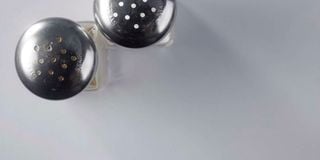Why you should reduce your salt intake as you age

Combine sodium-free seasonings and low-sodium diets.
What you need to know:
- Read food labels when grocery shopping and avoid products with high salt content.
- Always opt for fresh meat over-processed options such as bacon and canned beef.
- Remove the salt shaker from the dining table. This will help you avoid the temptation to add a few grams as you eat.
It's no secret that excessive intake of salt is bad for your health. Many people are not only aware of the health risks associated with a high salt diet but also the steps they should take to reduce the amount they consume. But what a lot of people don't know is that salt intake becomes even more important as you age. Your body is more sensitive and slightly elevated amounts of salt can cause serious health problems.
Reduce the risk of blood pressure
One of the most common problems caused by salt is high blood pressure. When you have high blood pressure, your heart has to work harder to pump blood through your body. This extra effort can lead to a variety of health problems such as heart disease, stroke, and kidney disease. All of these conditions are more common and severer in older adults. Without taking the necessary measures to keep your body healthy, most of these conditions can turn fatal.
To avoid harmful fluid retention
Excessive consumption of salt leads to a spike in blood sodium levels. Trying to balance the body's electrolyte levels, the body retains more water than is necessary. While this is usually harmless to young people, in older people it can cause extensive swelling in the extremities such as the ankles, feet, and legs. Among the older demographics, fluid retention starts as painless puffiness but progresses to severe health conditions such as shortness of breath and difficulty moving your arms and legs.
Excessive sodium increases the risk of dementia
One of the most surprising effects of salt is an increased risk of dementia. Dementia is a general term for the deterioration of cognitive abilities such as memory and decision making. A recent study showed that people with a high salt diet had around 30% higher chances of developing dementia than those who consumed less salt. The study also found that salt intake didn't just increase the risk of dementia but actually accelerated the onset of symptoms.
Avoid osteoporosis and other bone ailments
Osteoporosis is a condition in which your bones become weak and fragile. It's most common in older women but salt intake can increase the risk in both genders. When you consume salt, your body tries to balance the sodium levels by leaching calcium from your bones. This increased loss of calcium leads to weaker bones and a higher risk of fractures. In addition to breaking easily, bones with osteoporosis also heal at a slower rate. For some body parts, such as the hips and the spine, a serious fracture could easily lead to permanent health problems that reduce mobility and require constant care and medication.
Measures you can take to reduce salt intake
Almost every food item you get in the supermarket and restaurant has excess levels of salt. Therefore, if you want to reduce the salt you consume, you have to make a deliberate efforts and be consistent.
Some of the easy measures you can take include:
- Read food labels when grocery shopping and avoid products with high salt content. Check the marked levels of sodium, Na, salt, or soda as the manufacturer may choose to label.
This is especially important for canned foods.
- Go for the food products labeled “No salt added”
- Always opt for fresh meat over-processed options such as bacon and canned beef. Processed meats have higher salt content, added for preservation
- Remove the salt shaker from the dining table. This will help you avoid the temptation to add a few grams as you eat.
- Combine sodium-free seasonings and low-sodium diets
- Eat fresh fruits and vegetables, but moderate the salt you put in the vegetable salad
Reducing salt consumption will take time and effort, but it’s worth it
It might take time to get used to a low salt diet. You may have to let go of your favourite food or eat a bland version but eventually, you will get used to it.
If you are having trouble reducing your salt intake, talk to your doctor or a registered dietitian for help. They can provide tips and resources to make the transition easier. Reducing salt is a lifelong commitment but it's definitely worth it for your health. Start making changes today and enjoy a healthier tomorrow!




